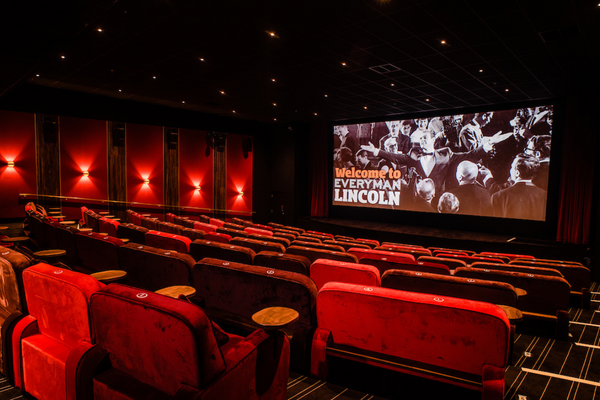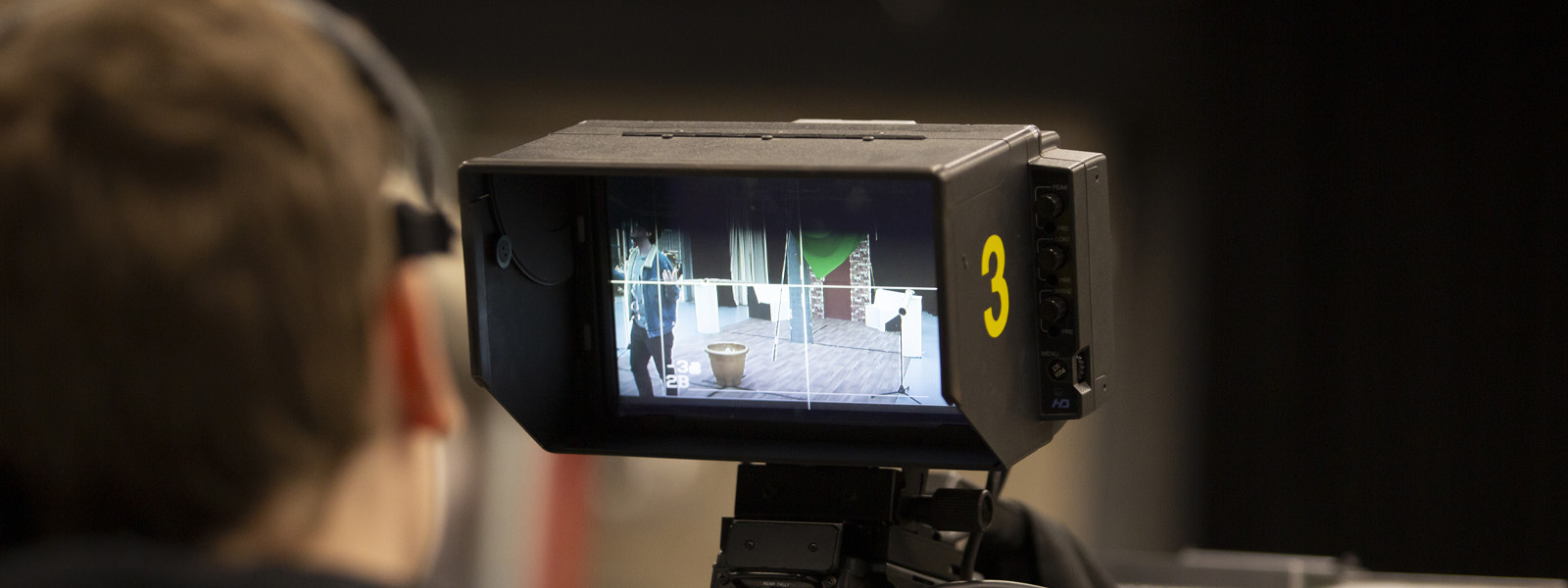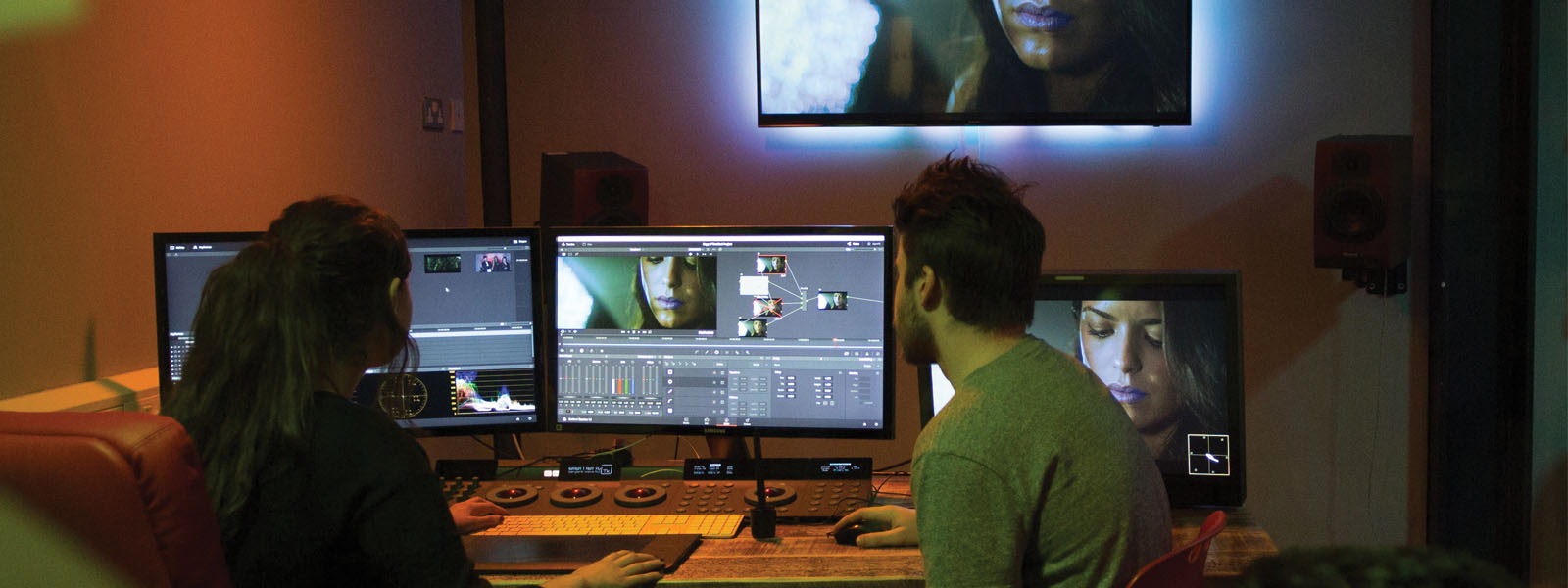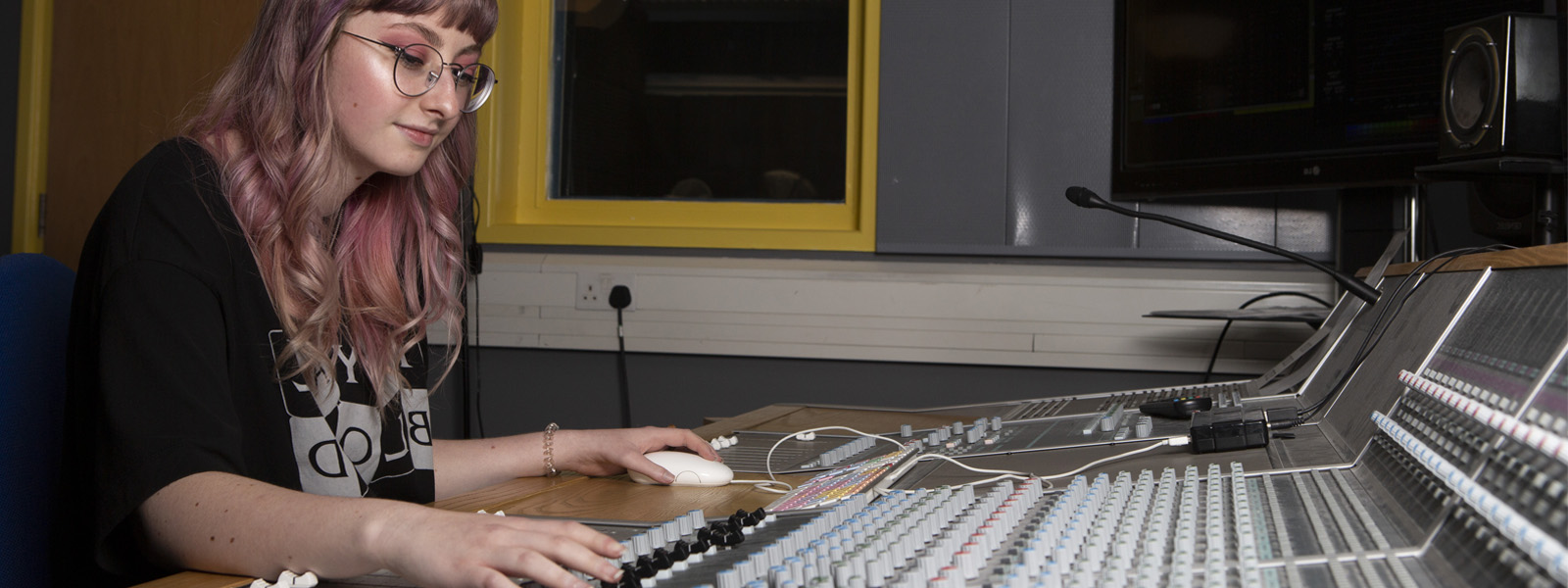Module Overview
This module can enable students to further develop skills in film production and apply them to a range of genre projects.
Lectures have been developed to present best practice in production techniques and offer stimulus for idea development in production projects.
Seminars aims to provide a programme of student support for production teams conducting a range of creative projects. This can include guidance on idea development, the proposal writing process, production critique and script development, as well as the pre- and post production techniques involved in carrying out successful scripts to a conclusion.
Students work in production teams in a range of roles as required by the project assessment briefs.
Module Overview
This is a screen acting and directing practically-based module that unites Drama and Film Production students in a shared workshop environment. Drama students can explore the fundamental approaches and practicalities involved in acting for camera, working with students from Film Production toward the creation of a filmed scene. For all students, the module allows for advanced practice-based understanding of script analysis, film acting, and directing in a studio environment, while developing planning, pre-production, and on-set methodologies for final filmed sequences. In this module Drama students can learn the skills, approaches, and techniques necessary in acting for camera, take and apply the direction they receive, and have their work appear in a final edited scene.
Module Overview
An in depth look into the practice, theoretical and technical skills of cinematography. Students will be introduced to the roles of the camera team, lighting team and the grip team. This module will prepare them to undertake the role of Cinematographer in their graduation films.
Module Overview
This module aims to introduce students to advanced techniques of film editing and creative picture and sound manipulation specifically related to the film production process. The module will introduce students to the craft of film editing from its widest perspectives, gain an understanding of narrative, story arc and story-telling techniques as well as knowledge of editing in various genres through practical exercises.
Module Overview
The module allows students to understand and develop the skills required to work towards becoming and industry ready film producer.
Module Overview
This module is an advanced level module in the practical screenplay craft, building on skills acquired in Advanced Craft Skills - Screenwriting. Students will explore the conventions of the feature film screenplay, developing story and scenes for a feature script of their own.
Module Overview
This module further develops students’ skills through use of advanced techniques of sound editing and design for all visual media outputs, such as film, television and screen devices. Through this, a deeper understanding of the role of the sound editor/sound designer and the audio post-production processes involved at the later stages of completion is achieved.
Students learn how sound is acquired for film and television productions and what happens to the sound after the picture editing is completed. Students will work with digital audio workstations and software technologies and the sound ‘dubbing theatre’. Areas covered include synchronising sound and picture rushes, import/export of audio files, supplying audio files for the editing process, audio tracklaying using Digital Audio Workstations (DAW’s), Editing dialogue and speech, recording Foley*, ADR* to picture; recording commentary and narration. Creative use of music in sound post-production is also covered, including composer spotting sessions, selecting and using production music and assessing musical requirements. The roles of mixer, assistant and sound editor are explored, in relation to selecting and assembling sound recordings and producing different mixes in preparation for final sound production of a television programme, film or screen based output. Students will understand the distinctive role of the film, television and screen sound editor and the creative sound post-production process for all moving image productions.
(*The art of movement re-recording and using props for sound effects creation to picture)
(*Automated Dialogue Replacement)
Module Overview
This module investigates and analyses the debates about and developments in children’s film and television in the UK, US and beyond, and is informed by politics, philosophy and ideology.
Module Overview
This module explores the history and theory of the documentary film. It will introduce students to media texts (films, video, broadcast television and digital platforms) that claim, in distinction to the cinema of fiction, to capture and re-present unmediated – to one degree or another-- reality. Students on this module will be asked to consider, via close text analysis and an understanding of moving image history, the problematics of making such a claim. This will involve students investigating the nature of the documentary image – that is: the relationship of the signifier to the thing signified. It will require them to determine the ethical implications of documentary’s claim on the real for the filmmaker, the persons filmed and the spectators. It will engage them in debates about documentary’s impact in the social sphere. The module will be organised around a series of case studies. Students will gain an understanding of media texts that have had a significant impact on society, knowledge of history and theory of documentary, and skills in close text reading and historical reception studies.
Module Overview
This module can enable students to further develop skills in film production and apply them to a range of genre projects.
Lectures have been developed to present best practice in production techniques and offer stimulus for idea development in production projects.
Seminars aim to provide a programme of student support for production teams conducting a range of creative projects. This can include guidance on idea development, the proposal writing process, production critique and script development, as well as the pre- and post production techniques involved in carrying out successful scripts to a conclusion.
Students work in production teams in a range of roles as required by the project assessment briefs.
Module Overview
A guide to specific films and accompanying theoretical concepts. Key films provide a platform for debating the political, institutional and cultural context of individual cinemas and regions in an increasingly globalised industry where audiences and producers are exposed to a variety of film styles. Critical engagement and debate are encouraged within the broader structure of World Cinema, alongside cultural and globalisation studies.
Module Overview
This module can enable students to further develop skills in film production and apply them to a range of genre projects.
Lectures have been developed to present best practice in production techniques and offer stimulus for idea development in production projects.
Seminars aims to provide a programme of student support for production teams conducting a range of creative projects. This can include guidance on idea development, the proposal writing process, production critique and script development, as well as the pre- and post production techniques involved in carrying out successful scripts to a conclusion.
Students work in production teams in a range of roles as required by the project assessment briefs.
Module Overview
The Minnesota State University Moorhead USA Exchange Programme is an optional unit of study. As part of the three-year course, some students may study for the duration of Semester A of level 2 at Minnesota State University Moorhead USA. The target units of study include areas of practical and theoretical studies comparable with those of Level 2 study for the Media Production Award at Lincoln.
During the semester abroad, students will share classes and units of study with local students. Students can experience another culture and have the opportunity to examine USA media industry practice through optional internships for exchange students. The Moorhead-Fargo twin cities also offer practical opportunities for students to engage with USA production companies including NBC, Fox, ABC, CBS, and Prairie Public TV, all of whom have local bases.
Module Overview
The module aims to introduce you to a range of conceptual and theoretical approaches to the study of horror in popular culture. It explores the history of the genre and selected subgenres as well as contemporary manifestations, both supernatural, and realist horror.
The module looks at the horror genre in terms of various social, cultural and national contexts. Students can study psychoanalytical approaches to these fictions as well as approaches such as affect theory which attempt to go beyond psychoanalysis. Through lectures, screenings and discussions, students are encouraged to apply these approaches to the analysis of selected media texts and subgenres.
Module Overview
This module aims to encourage students to consider the options open to them upon graduation and prepare for life after university. Students have the opportunity to reach into the wider community to develop their skills for future employment. The module aims to enable students to closely examine how a range of film production companies function on a day to day basis and relate their experience to their studies.
Module Overview
This module is an advanced level module in the practical screenplay craft. Students will produce and pitch finished short screenplays and begin to explore the conventions of the feature film screenplay.
Module Overview
The Industry Placement Year is an exciting opportunity for students to take a year out of formal study to gain real-world experience in the creative industries. Whether you’re looking to build industry connections, develop professional skills, or explore career options, this year will give you a full-time, hands-on experience within an arts, cultural, or creative organisation.
This year is a collaborative experience between you, your employer, and the University—ensuring that you get the most out of your time in a professional setting.
Module Overview
Location sound recording is a critical component of the film-making process. Ranging from the practical aspects such as multichannel field recording and microphone types, to understanding on-set etiquette and working with actors, it is a hugely challenging technical and artistic craft.
Students will learn how separate and synchronous sound is utilised in film production and how to effectively capture dialogue for factual and fiction productions. This module will equip students with the essential skills needed to provide filmmakers with high quality production sound.
Module Overview
This module aims to develop an understanding of the complex problem of realism in film and media studies as it relates to fictional narrative forms. Students will have the opportunity to engage with academic debates around realist texts and examine these in relation to historical, contemporary and potential examples.
Module Overview
This module will give students an advanced theoretical understanding of the craft skills employed in film production through observation and analysis of the work of pioneering filmmakers.

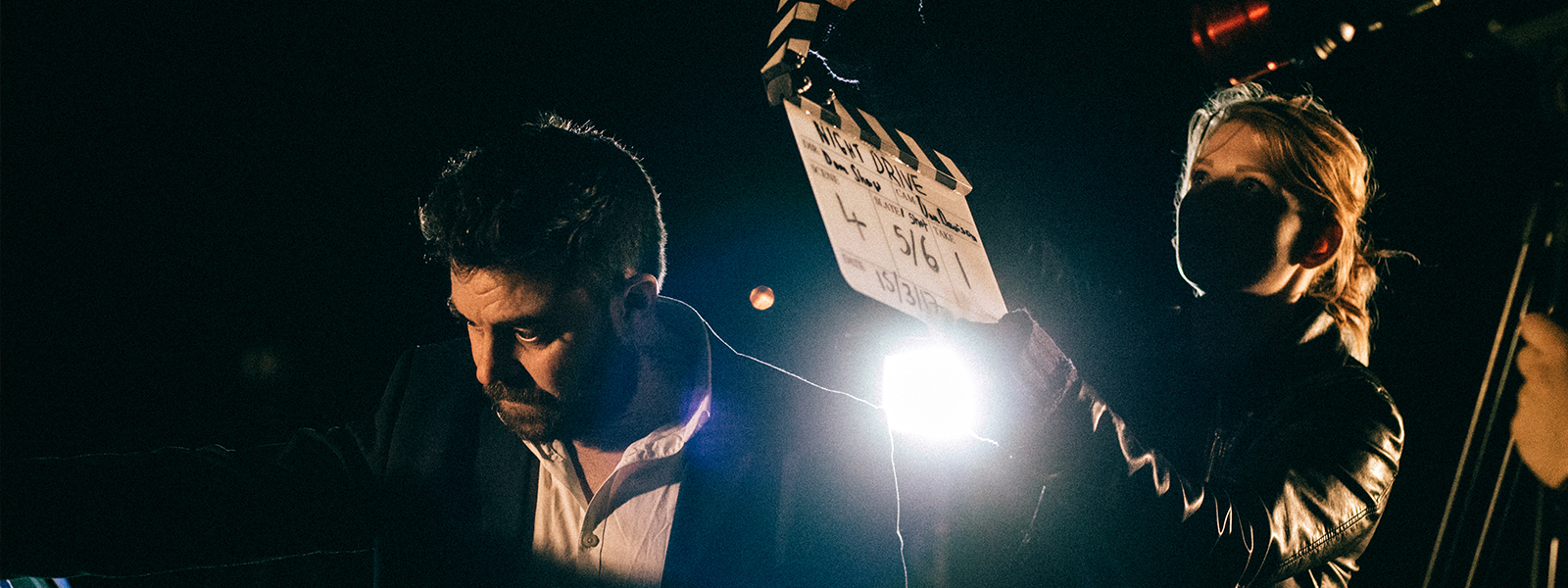

.png)
